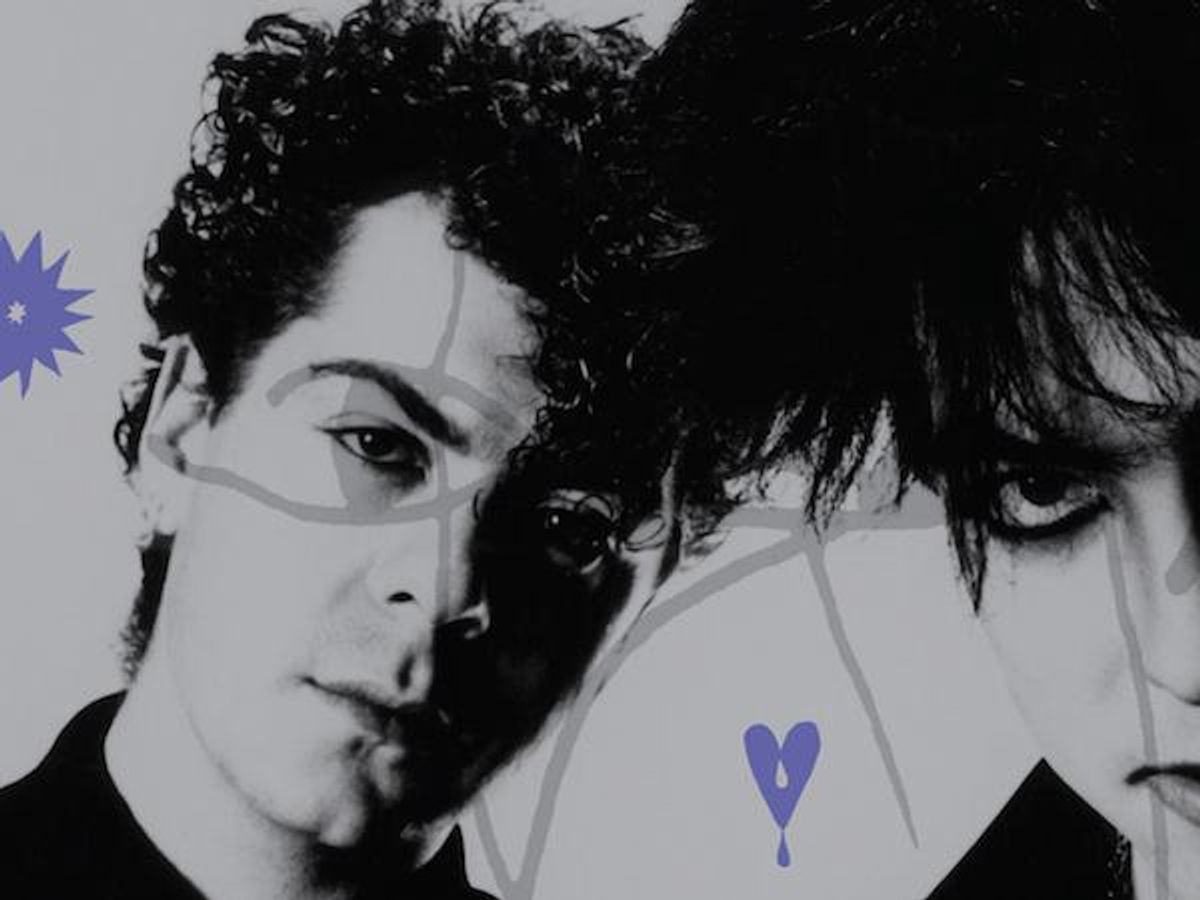Lol Tolhurst founded iconic post-punk/goth band The Cure with lead vocalist Robert Smith in Crawley, UK in 1976. After performing as the band's drummer and keyboardist for over a decade, his alcoholism caused him to leave the band. After a quarter of a century of legal battles, divorce, and pain, Tolhurst and his lifelong friends in The Cure made amends and played a series of reunion shows at the Sydney Opera House in 2011.
Chronicling his journey to international stardom, down to the darkest depths of addiction and isolation, and back to inner peace and creative fulfillment, Tolhurst has penned a memoir of his time with Smith in The Cure and on his own, aptly titled Cured: The Tale of Two Imaginary Boys, out now. We chatted with the artist about what it was like reliving such wild, sometimes painful memories, and what it means to be a true artist.
Out: What prompted the book? Was it part of your healing process? Did you feel like you owed fans the whole story?
Lol Tolhurst: That's an interesting question - I wanted to explain my life to myself. I got to a point where I was wondering, "What has gone on?" And I had an epiphany in 2013. I was in Hawaii, on vacation, and I went to see Robert, because The Cure were playing for the first time in Honolulu. I went to see them play, and we were sitting on the beach at 4 o'clock in the morning, chatting away, and I woke up the next day and thought, "I have to write this down. I have to record this, because otherwise I'm not going to understand the story." But also, as I went along in it, I realized, "OK, there's a bunch of people out there who I haven't seen in years, who would like to know as well." I wanted to set things right. I don't want to leave all of that crap for other people to deal with. I want to be rid of it, because I want to go out just the way I came in.
In the process of writing the book, and talking to all these people you wanted to give the story to, did you find there to be a lot of difficult conversations you had to have in your research? Or was it mostly positive reunions?
Mostly positive - I didn't really call people up and go, "Do you remember what happened?" Because I didn't want it to be somebody else's view of what happened. You're bound to incorporate that into your thought process. So I thought, "I'm just going to mine my memories and find out what I want to write from them." But what I did do, is if I hadn't seen these people, I'd talk to them and say, "OK, get out all your old albums." And that's what they'd do. And I went to London last year, because I live in California, and I visited people I hadn't seen in 25-30 years, and I said, "Show me your photo albums. With me in it." And that way we'd start a conversation.
Have Robert, or Porl, or Simon (other Cure members) been able to read the manuscript? Have they had any reactions?
Definitely Porl has, because he designed the cover. He lives in California now. I gave the manuscript to Robert in probably April or May - this year's very busy for The Cure, and the thing about it is, I know that with Robert, if I don't hear anything from him, that's fine. Because if he doesn't like something, he'll call me up straight away and be very direct with me. We've known each other for a million years. I did hear from Simon - he told me he thinks it's a great idea I'm writing a book. I think overall it's all positive. A lot of memoirs tend to be score-settling exercises, and I really didn't want to do that - the book was a vehicle for something a bit different for me. I didn't want to be "Behind The Music Part 1000." I wanted something that would evolve. That would be the framework, but it wasn't going to be the story. I really loved Patti Smith's book about her and Robert Mapplethorpe. That's a beautiful story about two people finding themselves in a very different world. So that's how I felt I could write about me and Robert, and then out of that comes the healing.
You get super personal in the book. You talk about your mom passing. And that's what you're saying - it's not just a "Behind the Music" story, but an emotional chronicle of feelings and experiences. So I wonder how this compared to writing a song. Did you find it to be more emotional?
If you look at the whole catalogue of The Cure's material, that's the area we go into anyway. It's always very connected with emotions, and that outsider stance. So for me, writing the book, to connect to my emotions, it seemed very natural. But unlike a song, it's a much longer process. It was a year of being in that space, every day. That's what I did. I thought, "If I sit at home and try and write it, it won't happen." I rented myself a little office about a mile from where I live. It was a co-working space. I went in there every day five days a week, and tried to bash out as many words as I could. Sometimes I'd be sitting there, and one of them would go, "Are you OK?" There'd be a tear that had come up, because when you write something like that, that's close to the emotional side, it's like reliving it. Writing about my mother was very painful. I wanted the book to have weight and depth. Before I wrote it I read a bunch of memoirs - the ones that struck me the best were always the ones that were honest and open about their emotions. Not just a commercial for somebody's life.
Whose memoirs did you like best?
A couple I found really good. One was surprising, but not really since I've talked to him. It was Duff McKagan's, from Guns N' Roses. And I also liked Steve Martin's, "Born Standing Up." It's the ones where people reveal themselves. It's much more human.
There's a passage in the book where you talk about the process of songwriting that you and Robert experienced, where you go into "the abyss." And you and Robert were able to go into the abyss and come out unscathed. I'm wondering if you can say any more about that, because it's so fascinating.
My basic premise there is what unites most artists of any fashion is that they are willing to look at things that most of the time the rest of society tells us we have to keep hidden. And that's the abyss. I know that for us, our most intense moments as musicians were going a little further and looking at this stuff, and writing about it, or reliving it. Sometimes, though, you can fall over into the abyss. I'm pretty sure that's what happened to me for a couple years. And I'm just glad I came out the other side, and didn't fall into this club - most people in bands die at about 27, if they're going to die from misadventure, it's about then. Luckily, I'm about twice that.
You talked about going to these dark times with alcoholism. And you mention a few different low points in the book, with the divorce, and the court drama. What would you imagine is your lowest low and highest high, if you can pick?
My lowest low in lots of ways is that point, and I can see it in my mind as I'm talking to you about it, where I got the letter (asking Tolhurst to leave the band) from Robert after Disintegration, and I went for a walk with my dog and I'm sitting up in the Moors, which is a very lonely, wild place - there's nobody there, and there's stormy skies, it's very evocative. And I lay on a rock, and I started crying. And I couldn't feel anything. That was about my lowest point. I had the emotional response, but I felt dead. Highs - it might sound cliche, but having this book done and finished is pretty much a high for me. It's something I've wanted to do for a very long time, and it's surreal at the moment because I'm going through a whirlwind of press. But that's what I'd call a high-class problem.
When did you first have the idea to do this book?
Twenty years ago, I got a tattoo on my arm that's two feathers my son found, crossed like writing quills. So somewhere in there, 20 years ago, I wanted to write this. I've talked to my book agent, who said "I have clients in their thirties who are writing books about their lives, and they have no perspective. Things that happened in their 20s are really close, so they can't see what the true meaning of those events were. You're at the perfect time to do it, because you're not so old you can't remember, but you also have a little space between the events." I've always thought about our music - people will say "some of it's depressing." It's not depressing, it's a willingness to feel how you feel. It's not always pretty.
Musically, do you have a proudest contribution or moment? A song, a moment onstage that's your proudest moment in the band?
I think it was really awesome, in 1985 we played a festival in Athens. One of the other bands that was playing was Culture Club, and Boy George had a terrible time, because he had to stand behind a screen, because people in the audience were throwing rocks at him. And about a week ago George and I did the same TV show in England. And I was talking to him, we've known each other from back in the club days, and I said "Do you remember that? Remember the festival?" And he was laughing, but he said, basically, "I'm still here." That's one of my best memories. It's awesome to walk onstage to a hundred thousand people, but it's also awesome to remember, "I'm still here. I'm still doing stuff." When you think about memories, you bring them from the past into the present.
Do you have a favorite gig?
I liked in 2011 when I met up with everybody again and we went down to Australia and played at the Opera House. In the space of about a few minutes onstage I was transported back to being a teenager, instantly. We were doing the same thing again that we used to do. It felt great. It was a high point.
Are there any musicians of the moment now who you like, and listen to?
It's funny, because a lot of people my age will say "There's no good bands anymore." And I'll tell them, "That's not true!" What's true is you don't know where to look anymore, you've forgotten where to look for it." My son is 24, he lives in San Francisco. So I go to him, and I say, "Show me what you're listening to. Something you think I'd like." And he showed me an electronic artist, Caribou, who I liked a lot. Things like that. I try to keep an open mind. Although I do know that as I get older, there's not that much new. There's variations on a theme from a while back, but there's not much startlingly original. But there are good permutations. Meg Myers, I saw recently. I liked her. So I like different things. I like anything that's honest.
Cured is available online and in bookstores now.




















































































